Alcohol-Vertigo Risk Calculator
Estimate Your Vertigo Risk
Key Takeaways
- Alcohol can worsen vertigo by affecting the inner ear, blood flow, and hydration.
- People with Meniere’s disease or BPPV are especially sensitive to even small amounts of alcohol.
- Limiting intake, staying hydrated, and avoiding sudden head movements can reduce flare‑ups.
- Seek medical help if vertigo episodes become frequent, severe, or are accompanied by vision loss.
What Is Vertigo?
When you hear the term Vertigo is a spinning sensation or loss of balance caused by disturbances in the inner ear or brain, the brain instantly pictures dizziness. Unlike a general feeling of light‑headedness, vertigo feels like the world is moving around you, often accompanied by nausea, vomiting, and trouble focusing.
Vertigo isn’t a disease itself; it’s a symptom that can arise from many conditions-vestibular migraine, infections, head injuries, or age‑related changes in the inner ear structures.
How Alcohol Affects the Body
Alcohol, chemically known as ethanol, is a central nervous system depressant. After you sip a drink, it’s absorbed through the stomach and small intestine, entering the bloodstream and raising your Blood alcohol concentration (BAC). Even a modest BAC of 0.02% can start to alter coordination and perception.
Two key ways alcohol interferes with balance are:
- Fluid balance disruption. Alcohol is a diuretic, prompting the kidneys to excrete more water. Dehydration thickens the fluid (endolymph) inside the inner ear, throwing off the delicate sensors that tell your brain which way is up.
- Blood flow changes. Alcohol causes blood vessels to dilate, which can lead to sudden drops in blood pressure. When the brain receives less oxygenated blood, the vestibular nuclei-tiny nerve clusters that process balance-can misfire.
Both mechanisms directly touch the Inner ear, the organ that houses the utricle, saccule, and semicircular canals-collectively known as the Vestibular system.
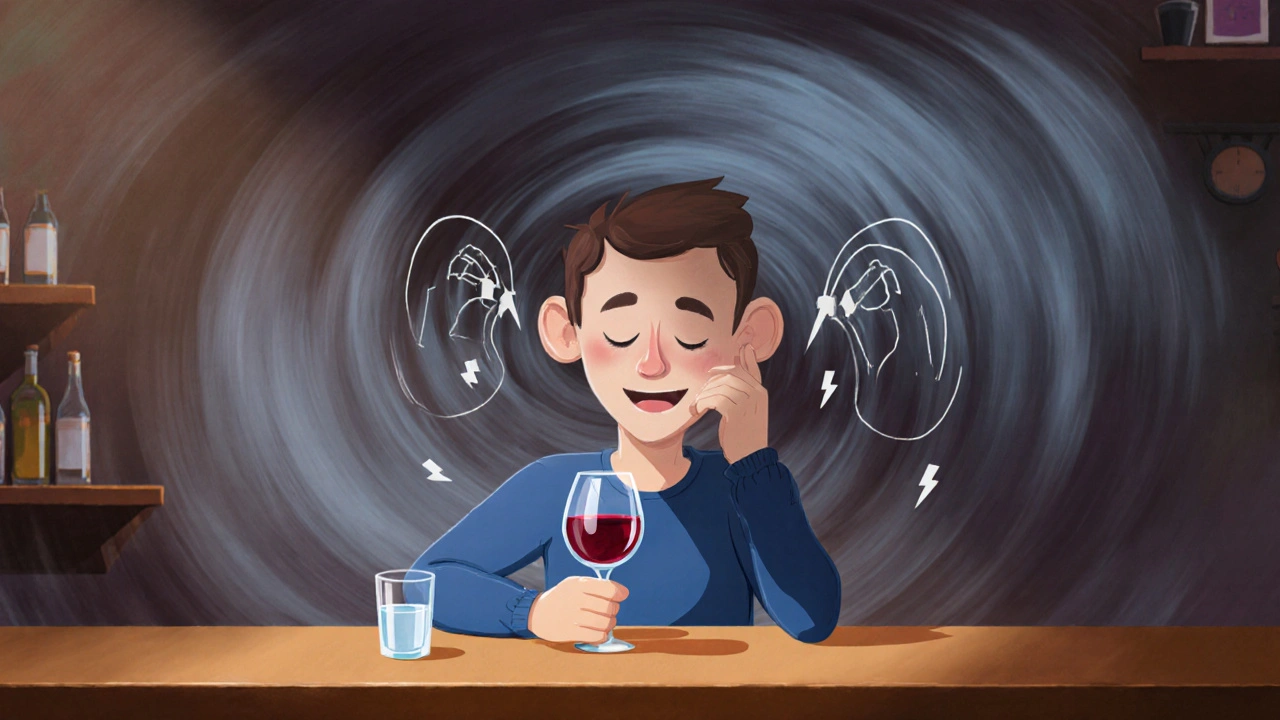
Direct Links Between Alcohol and Vertigo Symptoms
Research from the International Journal of Otolaryngology (2023) shows that people who consume more than two standard drinks per day report a 27% increase in vertigo episodes compared to non‑drinkers. The link isn’t just about how much you drink; timing matters too. Consuming alcohol shortly before lying down or moving your head quickly can trigger a sudden shift in endolymph that the brain struggles to interpret.
Here’s what typically happens:
- Alcohol thins the blood. This can reduce the pressure gradient needed for the otolith organs (the utricle and saccule) to detect linear acceleration.
- Dehydration concentrates inner‑ear fluids. The altered density makes the hair cells in the semicircular canals send inaccurate signals.
- Blood pressure dips. Low perfusion of the vestibular nuclei creates a temporary “sensor blackout,” which feels like a spinning room.
If you’ve ever felt dizzy after a night of wine, you’ve experienced a mild version of this cascade. For people already prone to vertigo, even a single glass can tip the balance.
Who’s Most At Risk?
Not everyone reacts the same way. Certain conditions make the vestibular system extra vulnerable.
| Alcohol Amount | Typical BAC | Effect on Vertigo | Who Feels It Most |
|---|---|---|---|
| One standard drink | ~0.02% | Minor fluid shift; may cause light‑headedness. | Healthy adults, occasional drinkers. |
| Two‑three drinks (within 1‑2hrs) | 0.04‑0.07% | Noticeable dehydration; mild vertigo in sensitive ears. | People with Meniere’s disease, BPPV. |
| Four+ drinks | >0.08% | Significant blood‑pressure dip; strong vertigo spikes. | Anyone with inner‑ear disorders or on antihypertensive meds. |
Two conditions stand out:
- Meniere’s disease-characterized by excess fluid (endolymphatic hydrops) in the inner ear. Alcohol adds another fluid imbalance, worsening attacks.
- Benign Paroxysmal Positional Vertigo (BPPV)-caused by tiny calcium crystals (otoconia) shifting into the semicircular canals. Alcohol can loosen these crystals, making positional triggers more frequent.
Other risk factors include chronic dehydration, use of anticholinergic medication (which already dries out the inner ear), and uncontrolled Blood pressure that swings with alcohol intake.
Practical Ways to Manage Vertigo When You Drink
If you enjoy a glass of wine or a craft beer, you don’t have to give it up completely. The goal is to keep alcohol from turning a pleasant evening into a spinning nightmare.
- Set a limit. Aim for no more than one drink per hour. Use a standard drink calculator to stay below a BAC of 0.04% if you have a known vestibular condition.
- Hydrate before and after. Drink a glass of water for every alcoholic beverage. This counteracts the diuretic effect and keeps endolymph at a normal density.
- Eat a balanced meal. Protein and healthy fats slow alcohol absorption, preventing sharp BAC spikes.
- Avoid sudden head movements. When you’re sipping, keep your head upright. Delay lying down for at least 30minutes after your last drink.
- Watch for triggers. Keep a symptom diary. Note the type of drink, amount, and any vertigo flare‑up. Patterns emerge quickly.
- Consider low‑alcohol or alcohol‑free alternatives. Many breweries now offer 0.5% ABV options that give the taste without the vestibular hit.
For those who notice any Nausea or vomiting after drinking, stop immediately and rehydrate with electrolyte‑rich fluids. Persistent vomiting can worsen dehydration and trigger more vertigo.
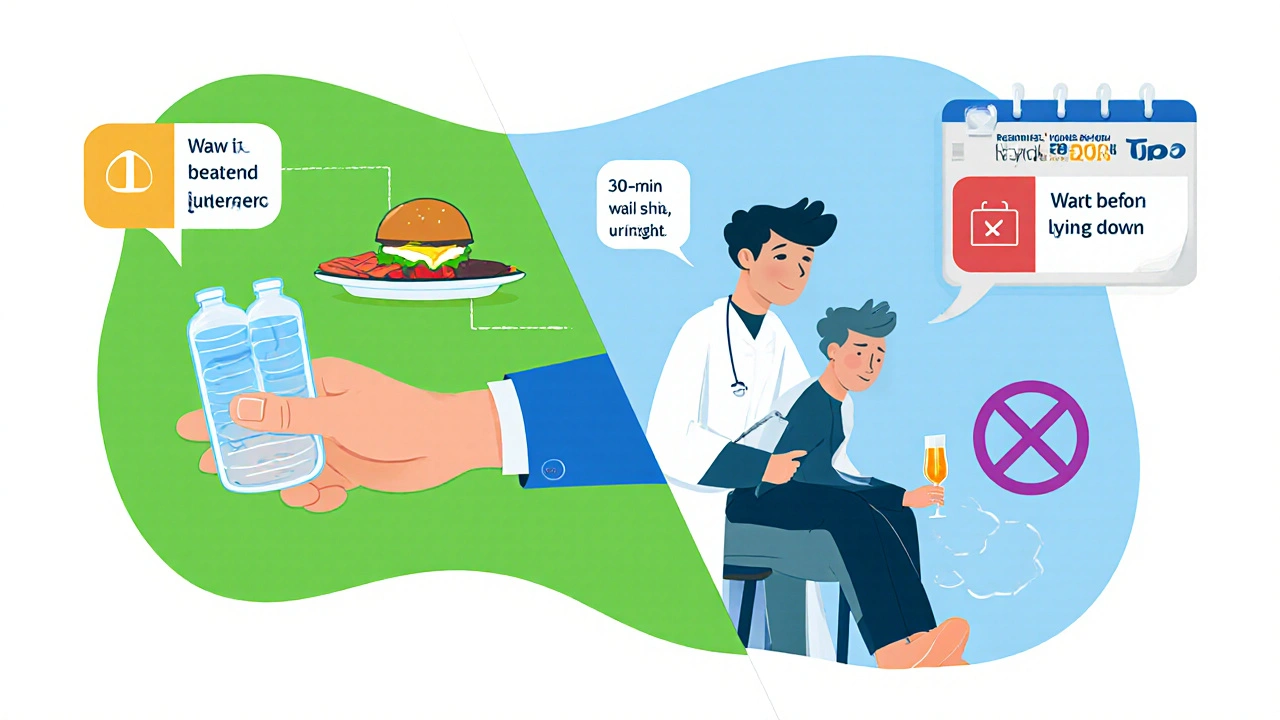
When to Seek Professional Help
Occasional light‑headedness isn’t usually a red flag, but certain signs mean it’s time to call a doctor:
- Vertigo episodes lasting longer than 24hours.
- Sudden loss of hearing or ringing in the ears (tinnitus).
- Double vision, slurred speech, or weakness on one side.
- Frequent falls or near‑falls.
An ENT specialist can perform a “head‑impulse test” and hearing evaluation to pinpoint whether alcohol is merely an aggravator or if an underlying disorder needs treatment.
Bottom Line
Alcohol interacts with the alcohol and vertigo connection on three fronts: fluid balance, blood flow, and blood pressure. If you already battle vertigo, keep drinks light, stay hydrated, and watch your body’s reaction. When symptoms become severe or unpredictable, professional evaluation is the safest move.
Frequently Asked Questions
Can a single glass of wine trigger vertigo?
For most healthy adults, one glass (≈14g of alcohol) may cause mild light‑headedness but rarely enough to spark full‑blown vertigo. People with Meniere’s disease or BPPV, however, can feel a noticeable spin even at this low level.
Is dehydration the main culprit?
Dehydration is a big piece of the puzzle. Alcohol‑induced fluid loss thickens the endolymph in the inner ear, which throws off balance sensors. Pairing alcohol with adequate water can blunt this effect.
Should I stop drinking completely if I have vertigo?
Not necessarily. Moderation, timing, and hydration are key. Many patients manage occasional drinks without flare‑ups by following the practical tips above. If symptoms persist despite precautions, a doctor may advise abstinence.
What medicines interact with alcohol to worsen vertigo?
Sedatives, antihistamines, and certain blood‑pressure drugs can amplify alcohol’s depressant effect on the vestibular system. Always check with your prescriber before mixing.
Can caffeine offset alcohol‑induced vertigo?
Caffeine is also a diuretic, so it can actually worsen dehydration. It may give a temporary alertness boost but won’t fix the inner‑ear fluid imbalance caused by alcohol.

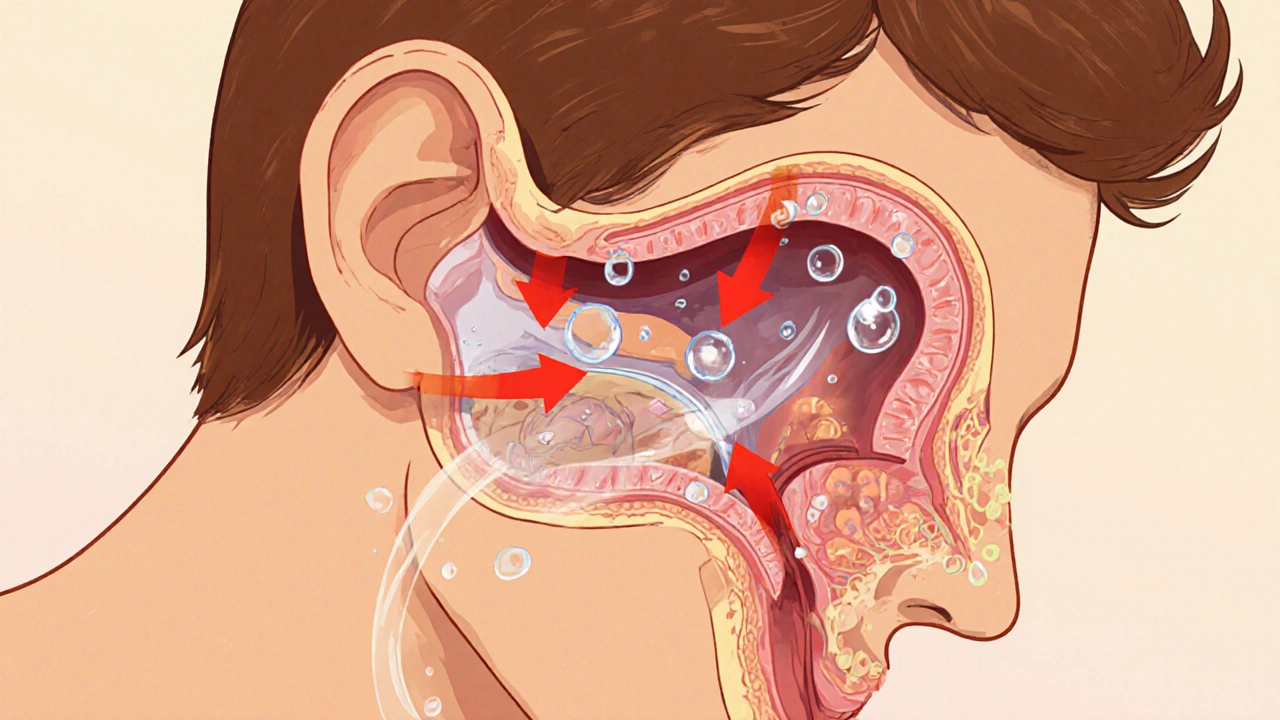
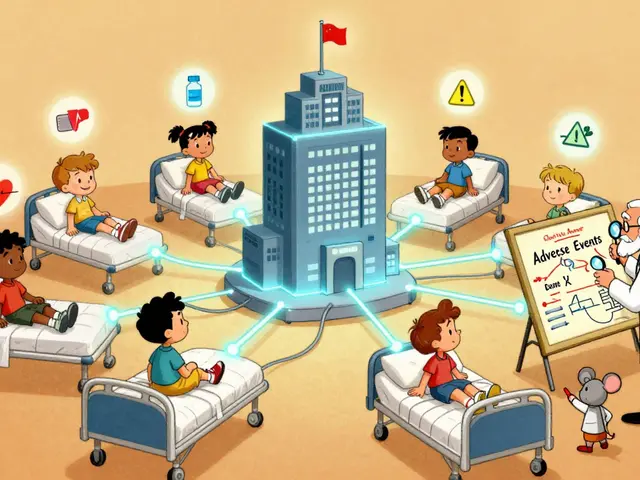
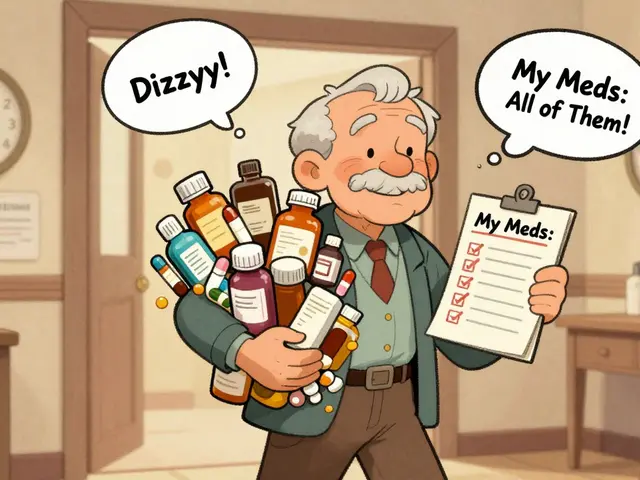
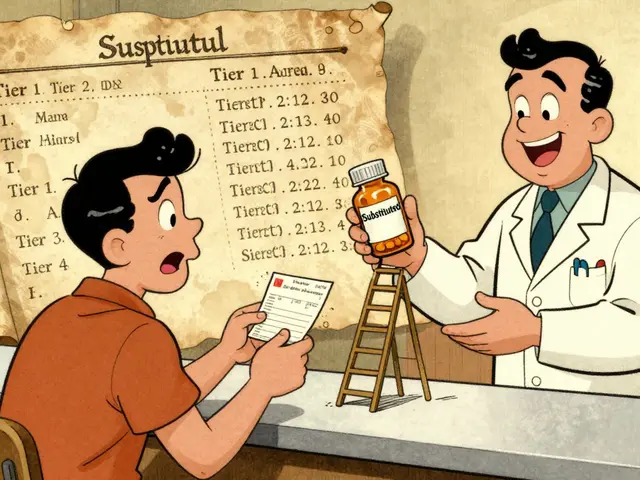
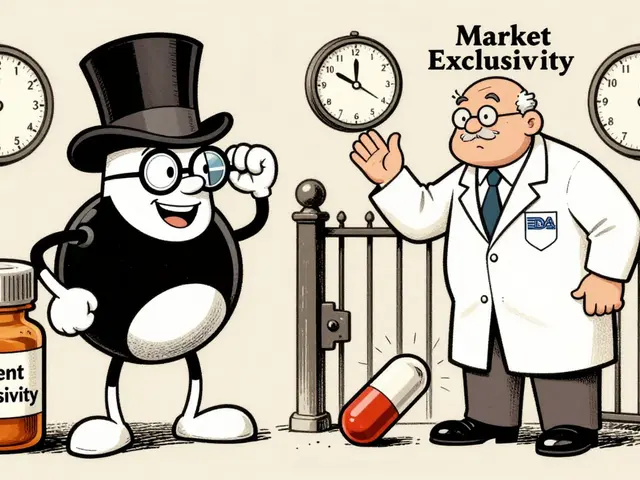
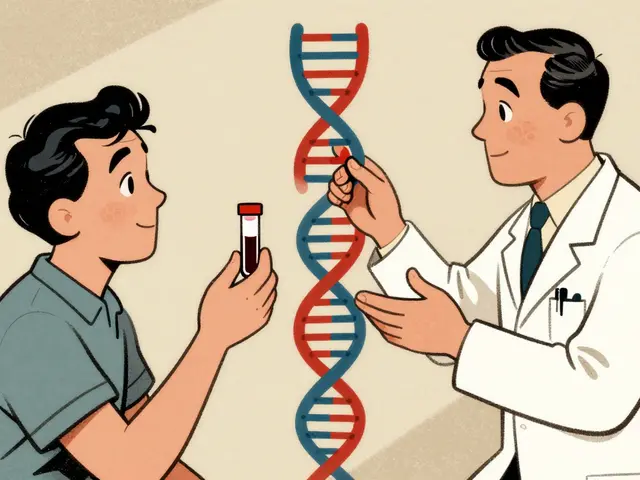

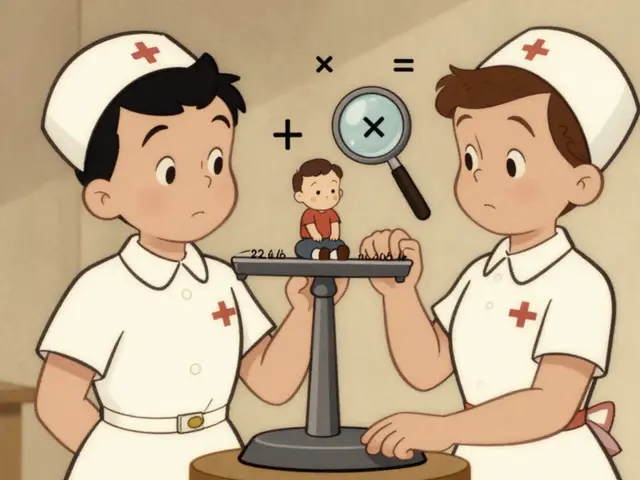
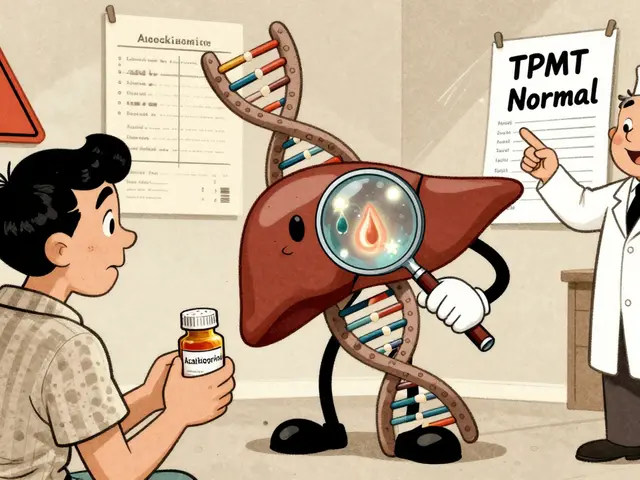
Wow, the way alcohol messes with the inner ear is pretty wild, especially when you think about the dehydration angle, the fluid shifts, and the blood pressure dips-it's like a perfect storm for anyone already struggling with vertigo. Staying hydrated before and after a drink can really help keep the endolymph from getting too thick, which in turn steadies the balance sensors. Also, pacing yourself to no more than one drink per hour gives the body a chance to metabolize the alcohol without spiking the BAC too high. I’ve found that having a solid snack beforehand slows absorption, so you don’t get that sudden drop in coordination. And, of course, avoiding sudden head movements right after drinking is a simple but effective tip to keep those dizzy spells at bay.
Honestly, blowing up every glass as a massive health threat feels a bit overblown, especially when moderate drinking rarely triggers full‑blown vertigo for most people. The body’s natural mechanisms can usually handle a couple of drinks without turning the world upside down, unless you already have a predisposition like Meniere’s. So, while it’s wise to stay hydrated, dialing the alarm to nine for each sip seems more like fear‑mongering than science.
Listen up, the whole "just a little wine" line is a straight up lie fed to us by the booze industry, a cabal that wants us addicted and dizzy while they watch from their ivory towers! Every sip is a calculated assault on the inner ear, a silent draining of the endolymph that the powers that be never want you to see. They hide the truth behind "moderation" but the reality is, alcohol is a diuretic that thickens the fluid in your vestibular system, turning you into a living compass that spins at their command. The blood‑flow changes are not just a side effect-they’re a tool to make you feel weak, disoriented, and more likely to obey the next propaganda broadcast. And don’t be fooled by the “diet wine” hype; the low‑calorie versions still carry the same blood‑thinning, pressure‑dropping magic. They also sprinkle caffeine into many drinks, compounding the dehydration and making it impossible for your body to recover. It’s all part of the grand design to keep the masses pliable, stumbling, and too busy cleaning up their own vomit to question authority. Hydration? Ha! They want you drinking electrolytes laced with hidden sweeteners that line their pockets. The only real defense is to cut the poison entirely and watch the world stop spinning like a carnival ride.
Stay woke, stay sober, stay free.
In the grand tapestry of human experience, our bodies are intricate instruments, and the vestibular system is a finely tuned violin. When alcohol enters the arena, it creates dissonance, yet we possess the agency to restore harmony through mindful practices. By honoring the balance of hydration, nutrition, and measured consumption, we become composers of our own equilibrium. Let us embrace the wisdom of moderation, not as restriction, but as a path to clearer perception and steadier steps on life's journey.
Just drink water.
Okay, here’s the practical science in a nutshell: limit your drinks to stay under a BAC of 0.04%, sip water between each alcoholic beverage, and avoid lying down for at least thirty minutes after your last drink. 🍷💧🛏️ This routine keeps the inner‑ear fluid at the right density and prevents those nasty blood‑pressure drops that can trigger vertigo. Trust the data and give your vestibular system a break-it’ll thank you! 😊👍
The real issue isn’t just the booze, it’s the shadowy agenda of the global elite to keep us in a perpetual state of imbalance, both literally and metaphorically. They lace drinks with hidden agents that sabotage our equilibrium, ensuring we’re too dizzy to notice the surveillance drones hovering above. By claiming it’s "just fluid dynamics," they mask the truth that our very perception is being weaponized. Stay alert, read the fine print on your cocktail menu, and don’t let the “moderation” myth lull you into complacency.
Dear community members, it is with great enthusiasm that I encourage you to adopt a disciplined approach to alcohol consumption, especially if you are prone to vertigo. By establishing clear limits, maintaining optimal hydration, and adhering to the recommended waiting periods before lying down, you can significantly reduce the risk of debilitating episodes. Let us embrace these evidence‑based strategies with vigor and dedication, thereby safeguarding our health and well‑being. Together, we can foster a culture of informed moderation and resilience.
These guidelines are useful, though I remain cautious about hidden additives.
Good points, I’ll keep a water bottle handy next time I have a beer.
Honestly, this whole “drink responsibly” spiel is just a weak excuse for people who can’t handle their liquor, and it’s absurd to think a few extra glasses cause major health crises. If you’re so scared of a little spin, maybe you should just stay sober forever instead of blaming the alcohol for every wobble.